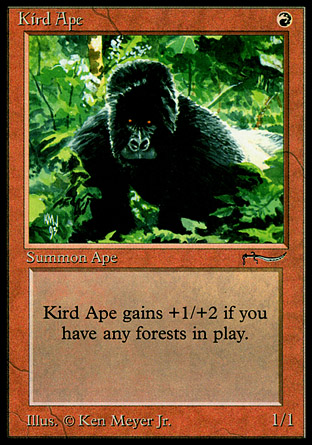Magic & Writing & Me
I started playing Magic in the fall of 1994, when I arrived at college, and when the game was only a year old. My then girlfriend got me into it, in a reverse of a common geek stereotype. (I knew several female Magic players in college.) I quit playing four years later, right before graduation, selling off all of my cards (including a Timetwister!), but I’ve continued to vicariously follow the game since. I rarely play, but I did draft some of Ravnica Block (so awesome), and just last week I played in a M13 draft while visiting friends in Philadelphia. I lost in the first round, 0–2—I’m a terrible player, very out of practice—although later I did win a thee-person game of Commander, over dinner at a diner, where I played this deck. (In the M13 draft, I went Blue-Green, and had a decent deck, but very few ways to interact with my opponents’ creatures, and was done in by a Vampire Nighthawk—such a sick card! Although, in my defense, in the second game, I was forced to mull to 5, then never got a third land—and I think I still could have actually won, had my play been tighter….)
Back to vicariousness. I read Mark Rosewater’s “Making Magic” column every Monday (or Sunday night), and watch every video that Luis Scott-Vargas posts online. (He’s hands down my favorite player of all time, and I can’t wait until he gets elected into the Pro Tour Hall of Fame next year. Speaking of which: congratulations to Pat Chapin for making it in this year!) What can I say? Magic is fun and insanely complex; I like games and I like obsessive analysis. It also doesn’t hurt that it’s fantasy-based, one of my lifelong loves. And I’ve learned a tremendous amount about design and aesthetics by talking and reading about the game. (Rosewater’s weekly column is responsible for at least half of that.)
Magic The Gathering as Literature, part 3: The Vocabulary
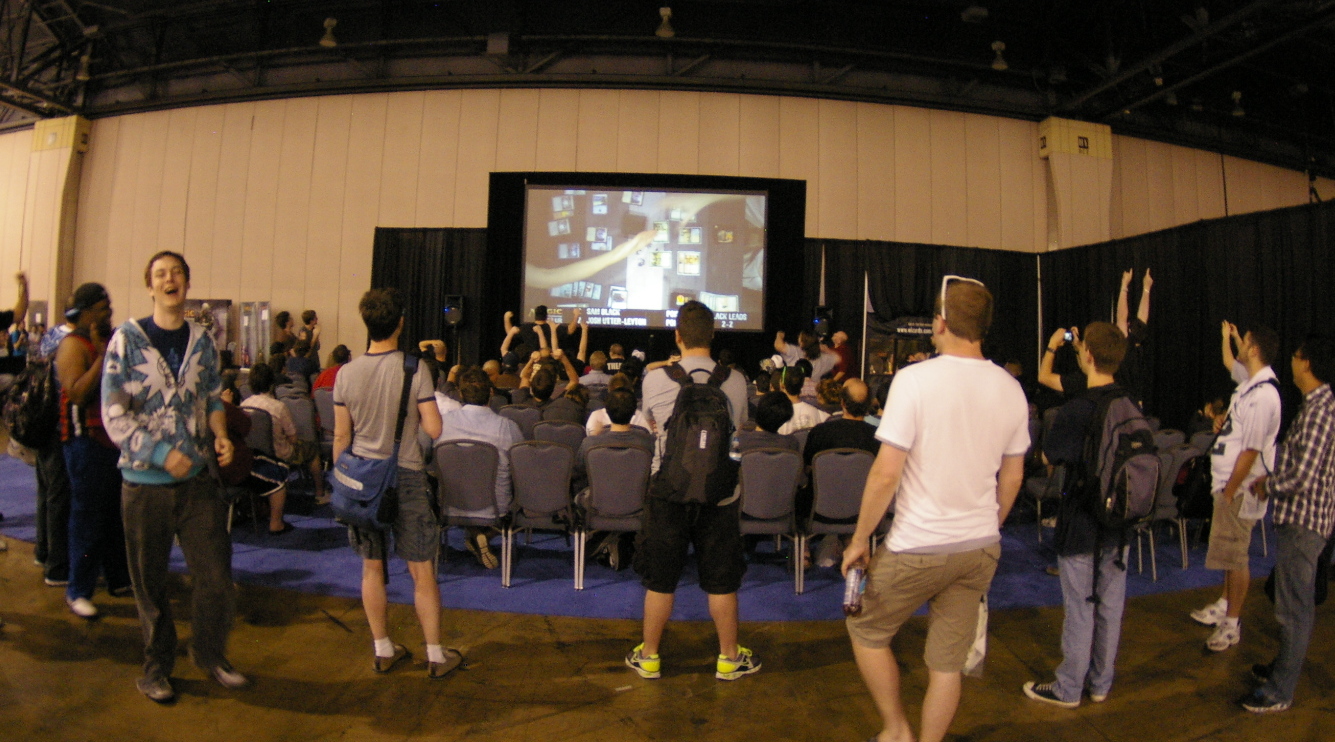
Players react as Josh Utter-Leyton defeats Sam Black in the semifinals.
It’s day three of Pro Tour Philadelphia, and the final (“Top 8”) competition is underway. This part of the tournament is webcast (you can watch it live here), and is also being transcribed. (Since this is such high level play, players will want to read descriptions of what, precisely, happened on each turn; this is what Bill Stark was doing in the photo at the top of Part 2.)
These match transcriptions often read like a foreign language to non-players. For example, here’s an excerpt from a write-up of a match played yesterday between Jeremy Neeman and Luis Scott-Vargas:
Magic The Gathering as Literature, part 2: The Articles

Bill Stark (seated far right) documents a feature match between David Williams (seated left) and Brian Kibler (seated right).
Greetings once again from Pro Tour Philadelphia! The second day of the tournament is well underway. As you’ll recall from Part 1, I’m curious to what extent this event—and all Magic culture—is a literary phenomenon. The most obvious place to start seems to be the wealth of Magic articles produced every day by the game’s players, designers and developers, judges, and casual bystanders, some of which I think will interest the upstanding gormandizers at HTMLGIANT. Let’s take a closer look, shall we?
Magic The Gathering as Literature, part 1 (introduction)
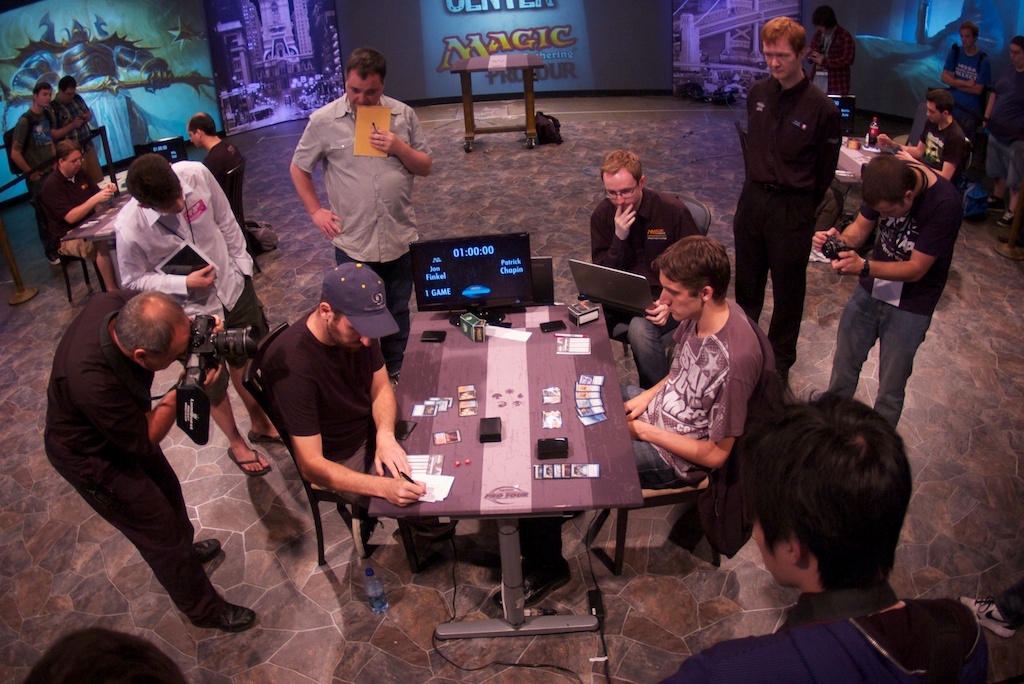
Jon Finkel (seated left) plays Patrick Chapin (seated right) in a feature match at Pro Tour Philadelphia 2011.
Hello! I’m new here.
I am in Philadelphia, attending a professional Magic: The Gathering tournament (Pro Tour Philadelphia 2011). The event runs through Sunday, and throughout the weekend, I’ll be posting updates “from the floor,” so to speak. I’m currently sitting in the pressroom (I have a press pass!) alongside a few other reporters; they’re busy Tweeting and posting about the current tournament standings, what the format looks like, which cards and decks are proving the best. It’s high stakes stuff—one of four invitational tournaments held annually around the world (the last two were in Paris and Nagoya; the next will be in December in San Francisco), with a top prize of $40,000.
All of which, I think, should interest even those who know nothing about the game. Here’s why:
Magic the Gathering: Fear, Crumble, Lifetap
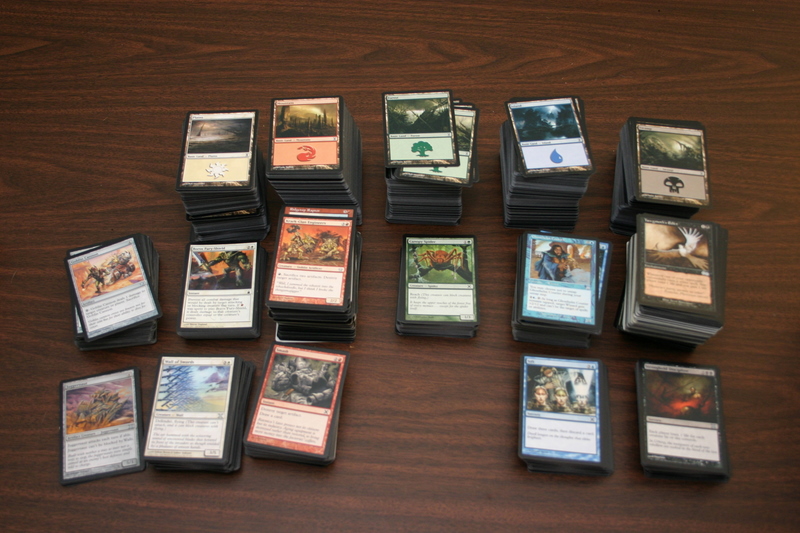
I don’t give a fuck: I like Magic. I haven’t played in at least ten years, but even just off my memories of the game up to, oh, 18, and later in the online versions, I will attest that MtG is the greatest and most intricately strategic and customizable game ever created. Fuck chess and backgammon. Magic is a universe where not only are there so many possible utilities under the array of spells and creatures you can involve in any given match, but also a ridiculous level of inner-tuning, logic, semantic, prediction, counteractivity, and innovation of nuts and bolts. It is the ultimate rendering of a game where to be successful you must decide your approach, construct your apparatus, and operate that apparatus under the manner of luck and the countless structures employed by each opponent. There are so many fucking spells.
Today I’m bored again and found my old archives of cards I have left after I sold most of them off when I quit in high school. I decided to pull 3 cards out at random and write about their utility. It seems to me to have a lot to do with manipulation of other entities, like words and systems of words.
Oh, and also, kiss my ass, Magic rules.
August 12th, 2010 / 2:11 pm
Magic is tight
Winner of the Magic: The Designing Contest at Kitsune Noir, by Pedro Fernandes [via Clusterflock]
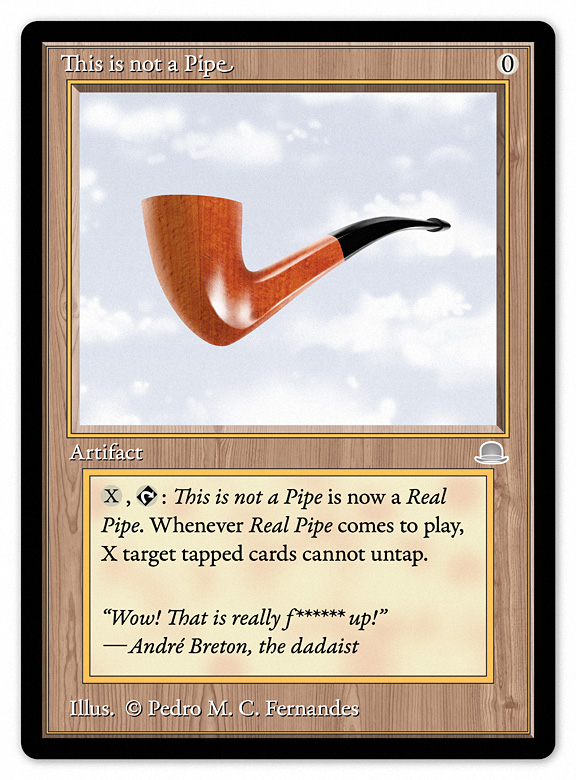
Any Magic freaks in the building? Wish I still had that shit. Like I wish I had my Dragonlance novels I sold in a lot on eBay. Worst move ever.

